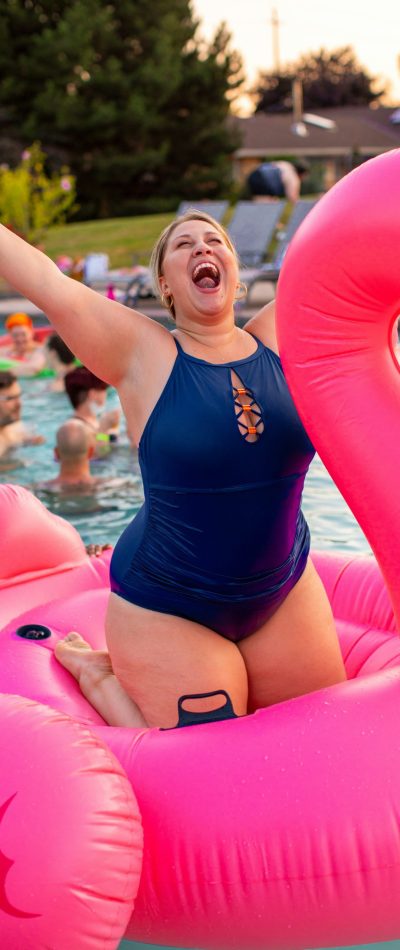Surviving Summer: Eating Disorder Support & Recovery Tips
I’m an eating disorder therapist, a woman, and someone who has a body, so I am well aware of the pressures that summer bring to myself and my clients. I’ve been thinking about you, the one who is reaching out for some support and encouragement right now when diet culture’s voice has gotten really loud! Summer is painted as a season associated with sun, fun, and relaxation, but I know for many it can be a time of heightened anxiety due to the pervasive diet culture that promotes unrealistic body standards. The pressure to achieve a “beach body” can feel all encompassing, and it can feel hard to get away from the thoughts, expectations and discussions about how to “perfect” or “improve” your body. If you’ve been struggling with not liking your body, comparing yourself to others, or nourishing your body appropriately this summer – I see you, and this blog is for you. I’ve included some practical ways to navigate the season with self-care and body positivity at the forefront.

1. Wear Clothes That Fit and Feel Good on Your Body
The first step to feeling comfortable this summer is to wear clothes that fit your body as it is now. Avoid the temptation to squeeze into last year’s swimsuit if it no longer fits comfortably. Instead, invest in new pieces that make you feel confident and free. Clothes that fit well can enhance your comfort and allow you to focus on enjoying your activities rather than worrying about how you look. As you are choosing what you will wear, notice the textures, patterns and feeling of the clothes and prioritize clothes that make you feel like your best self.
2. Curate Your Social Media Feed
Social media can be a really difficult place to be when you are actively fighting against an eating disorder and diet culture. As hard as it may be, I’d encourage you to take control of your feed and unfollow and mute accounts that make loving your body difficult. If you find yourself comparing yourself to someone else’s body – mute them. If an account focuses on weight loss and promotes disordered eating – unfollow them. As you empty your feed, fill it up with influencers and activists who celebrate all shapes and sizes, and who focus on self-love and acceptance. This positive reinforcement can help shift your mindset and reduce the impact of diet culture. Here are a few accounts that focus on eating disorder recovery:
@i_weigh
@redfine_wellness_
@hillarylmcbride
@blackandembodied
@growing.intuitive.eaters
@thebirdspapaya
@feelgooddietician
@recoveryrebecca
@parrallelwellness
@nourishingthewholeperson
@amy.kobelt
3. Practice Daily Affirmations
Incorporating daily affirmations into your routine can be a powerful tool for combating negative self-talk and fostering a positive self-image. Affirmations such as “I am worthy of love and respect just as I am,” “My body deserves kindness and care,”, “I can nourish my body even if I am struggling with my body image” and “I choose to focus on what makes me happy” can reinforce a healthier relationship with your body. Repeating these affirmations can gradually rewire your thinking and make your self-compassionate voice louder, and diet culture’s voice quieter. I recommend writing these in your phone, posting them in your kitchen or bathroom, and putting them where you will see them.
4. Engage in Activities That Bring You Joy
Focus on engaging in activities that bring you joy and fulfillment rather than those driven by the pursuit of a particular body image. Whether it’s swimming, hiking, reading, napping, knitting or spending time with loved ones, prioritize activities that make you feel good and enhance your overall well-being. Notice what types of activities you can do when you nourish your body appropriately. Have you ever noticed that you run and play a lot faster and with more energy when you eat nutrient filled meals and consistently throughout your day? I have! Some days you may not have the energy for intense exercise, however going for a walk, napping at the beach, laying in a hammock, or doing some gentle stretching or yoga are all ways that can bring care to your body. No activity or exercise is better than others.


5. Surround Yourself with Supportive People
Surrounding yourself with supportive friends and family can make a significant difference in how you experience the summer and your relationship with your body. Seek out relationships that uplift and encourage you to be your authentic self and make you feel cherished and valued regardless of the size of your body. Having a strong support system can provide a buffer against the negative impacts of diet culture and help you stay grounded in your self-care practices. It can be helpful to share your struggles with safe people in your life as they can remind you of your values, and encourage you in nourishing your body. Finding people who will also respect your boundaries around discussing food and bodies can be really helpful, so you know that spending time with those people won’t be triggering.
6. Seek Professional Help If Needed
If you find that diet culture is significantly impacting your mental health, don’t hesitate to seek professional help. Counsellors and dieticians who specialize in body image issues can provide you with strategies to cope and thrive. Professional support can offer valuable insights and tools to help you navigate the summer with greater ease and self-compassion. If you are looking for professional support, our team has skilled and specialized therapists that can help you – wherever you are in your journey with your body and food! You can reach out to them here.
Putting it in Practice
My hope after you have read this blog is firstly, that you know you are not alone. Acknowledging that you are struggling is such a vulnerable thing, even to yourself. If you’re reading this blog I know that likely means that you (or perhaps someone close to you) are struggling to love yourself as you are now. It is so hard to go against what you have learned from diet culture for years, so let’s be kind to ourselves in the process. Having a bad recovery day doesn’t define you. Having a hard body image day doesn’t mean that you won’t ever heal. You and your body are amazing, and I am so proud of you for admitting that you want more for yourself than what society has said you should be. Pick one thing from this blog to try to implement today to get yourself started, and know that you can always reach out for support here if you need some encouragement!




